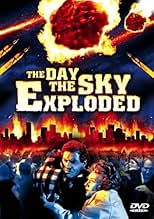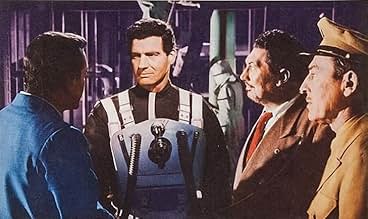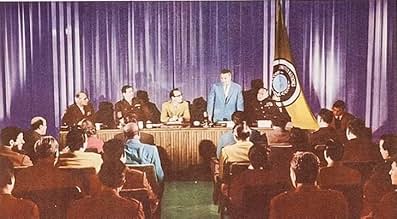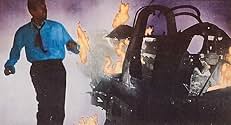अपनी भाषा में प्लॉट जोड़ेंScientists discover that a group of meteors are hurtling on a collison course with Earth, and if they hit, the planet will be destroyed.Scientists discover that a group of meteors are hurtling on a collison course with Earth, and if they hit, the planet will be destroyed.Scientists discover that a group of meteors are hurtling on a collison course with Earth, and if they hit, the planet will be destroyed.
- निर्देशक
- लेखक
- स्टार
Madeleine Fischer
- Katy Dandridge
- (as Madeline Fischer)
Dario Michaelis
- Peter Leduq
- (as Darrio Michaelis)
Gérard Landry
- Randowsky
- (as Sam Galter)
Jean-Jacques Delbo
- Sergei Boetnikov
- (as Jean Jacques Delbo)
Annie Berval
- Lab Assistant
- (बिना क्रेडिट के)
S. Louis Casta
- Doctor
- (बिना क्रेडिट के)
Livio Lorenzon
- British General
- (बिना क्रेडिट के)
Peter Meersman
- General van Dorff
- (बिना क्रेडिट के)
Shane Rimmer
- John McLaren
- (English version)
- (वॉइस)
- (बिना क्रेडिट के)
Giacomo Rossi Stuart
- Stuart
- (बिना क्रेडिट के)
Gianni Solaro
- French General
- (बिना क्रेडिट के)
Massimo Zeppieri
- Dennis McLaren
- (बिना क्रेडिट के)
फ़ीचर्ड समीक्षाएं
One problem that has long bothered most filmmakers, since the dawn of cinema, is the smoke-and-mirrors magic act itself--namely, getting big, great, creative ideas that movie watchers will be interested in and like, while getting these ideas across in as budget-conscious a manner as possible. Take this film, 'The Day the Sky Exploded', for instance (but make sure you give it back--I liked it LOL). Rome-born director Paolo Heusch (who later made the no-budget enjoyable thriller, 'Werewolf in a Girl's Dormitory') wisely utilized as much stock footage as humanly possible, and a fine cinematographer in future horror-aficionado hero Mario Bava (though his name is bizarrely misspelled in the film's credits), to credibly bring his ambitious ideas of widespread panic and civil unrest to fruition.
Mildly problematic is the dated way that women are portrayed here. Usually in older films, this isn't bothersome to me, simply because it was so widespread, and thus expected to a certain extent, but that doesn't mean it was right. For example, the only two principal women in the film are the wife of the main astronaut, who basically is left to complaining that she doesn't get enough attention from him while the world is in chaos, and a math expert, considered 'cold' because she dares to simply think about her job, who basically falls to pieces when the going gets tough (though, to her credit, she comes to her senses). And, playing the devil's advocate for a moment, it was kind of crappy that it was a Russian who went crazy and made thinks difficult for the scientists who were binding together to try and save the world. But those are minor nit-pickings.
It made me very happy to watch this valiant cinematic attempt. It left me far more satisfied than later, big-budget efforts in the area, such as 'Deep Impact' and 'Armageddon'. Some fanfare for the common man, please! =)
Mildly problematic is the dated way that women are portrayed here. Usually in older films, this isn't bothersome to me, simply because it was so widespread, and thus expected to a certain extent, but that doesn't mean it was right. For example, the only two principal women in the film are the wife of the main astronaut, who basically is left to complaining that she doesn't get enough attention from him while the world is in chaos, and a math expert, considered 'cold' because she dares to simply think about her job, who basically falls to pieces when the going gets tough (though, to her credit, she comes to her senses). And, playing the devil's advocate for a moment, it was kind of crappy that it was a Russian who went crazy and made thinks difficult for the scientists who were binding together to try and save the world. But those are minor nit-pickings.
It made me very happy to watch this valiant cinematic attempt. It left me far more satisfied than later, big-budget efforts in the area, such as 'Deep Impact' and 'Armageddon'. Some fanfare for the common man, please! =)
In THE DAY THE SKY EXPLODED, a space exploration disaster causes impending doom when a super-asteroid heads toward Earth.
We know this is science fiction because in this story the UN takes immediate action, scrambling all forces to deal with the situation. In reality, they would convene in order to call for a future meeting, so they could decide whether or not to pass a resolution that could lead to a plan.
Thankfully, the fantasy UN is mighty!
Is this movie cheeezey? Oh yes, but it's also entertaining. Compared to the more modern, multi-million dollar space catastrophe films that tell the same basic tale, TDTSE is -very little- money well spent...
We know this is science fiction because in this story the UN takes immediate action, scrambling all forces to deal with the situation. In reality, they would convene in order to call for a future meeting, so they could decide whether or not to pass a resolution that could lead to a plan.
Thankfully, the fantasy UN is mighty!
Is this movie cheeezey? Oh yes, but it's also entertaining. Compared to the more modern, multi-million dollar space catastrophe films that tell the same basic tale, TDTSE is -very little- money well spent...
It is hard to give a rating to old movies like this. This Italian/French film is a predecessor to modern fare like Meteor or Armegeddon.
No Bruce Willis, but Paul Hubschmid, the first Swiss film star. He is on a team of astronauts that included a Frenchman and a Russian and was selected for the first mission in space. Such international cooperation! Absolutely brilliant for the time. It will be even more amazing as the film goes on.
Don't look for great acting or fancy special effects. Stock footage is the norm and the dialog is corny, but there is a bright shining moment when they know they are all doomed and some scientist wigs out.
The solution to the falling meteor is the use of all the nation's atomic warheads. Like that would happen. You know the USA or Russia, probably both, would hold a few in reserve. I am sure the USA did, as I saw no missiles leaving silos.
It's interesting to see the first films of this type before CGI, which is why I am investing the week exploring them.
No Bruce Willis, but Paul Hubschmid, the first Swiss film star. He is on a team of astronauts that included a Frenchman and a Russian and was selected for the first mission in space. Such international cooperation! Absolutely brilliant for the time. It will be even more amazing as the film goes on.
Don't look for great acting or fancy special effects. Stock footage is the norm and the dialog is corny, but there is a bright shining moment when they know they are all doomed and some scientist wigs out.
The solution to the falling meteor is the use of all the nation's atomic warheads. Like that would happen. You know the USA or Russia, probably both, would hold a few in reserve. I am sure the USA did, as I saw no missiles leaving silos.
It's interesting to see the first films of this type before CGI, which is why I am investing the week exploring them.
This is significant as Italy's first science-fiction movie – two years after its first horror outing, Riccardo Freda's I VAMPIRI (1956); what connects these two films is the multi-faceted involvement behind the cameras of the late great Mario Bava. In fact, the latter was officially the film's cinematographer (curiously credited as Baja on the English titles!) but, as was his fashion, he helped out without credit in the special effects department and the direction as well – a fact also mentioned in Tim Lucas' Audio Commentary for the subsequently deleted Dark Sky DVD of Bava's KILL, BABY
KILL! (1966) and whose hearing prompted me to acquire this film sooner rather than later! Interestingly, the film's original Italian title LA MORTE VIENE DALLO SPAZIO translates to DEATH COMES FROM OUTER SPACE; this was picked up and slightly altered a few years later by another Spaghetti sci-fi entry i.e. Antonio Margheriti's LA MORTE VIENE DAL PIANETA AYTIN aka THE SNOW DEVILS (1967); besides, the film's English title was probably inspired by another contemporary sci-fi cheapie i.e. Fred F. Sears' THE NIGHT THE WORLD EXPLODED (1957)! The film under review emerges as a reasonably enjoyable and above-average entry but, probably stemming from a very limited budget, is bogged down by a talky script and much stock footage of rocket launchings and people rushing into underground shelters. The cast is also somewhat undernourished but does include Paul (Fritz Lang's Indian EPIC diptych [1958-59]) Hubschmid, Ivo (Bava's BLACK Sunday [1960]) Garrani and Giacomo (KILL, BABY
KILL!) Rossi Stuart essaying stock-types of lock-jawed astronaut, self-sacrificing professor and no-nonsense technician respectively. Equally predictable are the characters of the proud Russian expert, the astronaut's lonesome wife, the brainy female scientist, her lothario colleague and the crazed skeptic who reaches breaking-point as Armageddon looms. Nevertheless, despite – or, perhaps, because of – the lack of any really spectacular sequences (the rain of meteorites ostensibly about to annihilate mankind never pose that much of a threat since they are themselves destroyed just as they are entering the Earth's orbit!), one finds himself being charmed just the same by all these overly-familiar elements. Almost needless to say, hot on the heels of this movie came the Riccardo Freda/Mario Bava melange of sci-fi and monster movie – CALTIKI, THE IMMORTAL MONSTER (1959) – which was an altogether livelier effort...
This little Italian oddity offers the drama of a world-wide disaster and the themes of international cooperation which were better capitalized by the Star Trek franchise and several similar disaster films of more recent vintage.
The film is somewhat unique for its unusually jerky pace, clever low budget effects, odd use of stock footage, and strange cinematography. The Day the Sky Exploded begins as if it is going to be a space-flight adventure, but instead treats the space flight in a realistic, almost mundane manner, before proceeding to reveal the real plot - concerning the meteors. The astronaut (nicely played by Hubschmidt) is forced to eject from the nuclear powered rocket and the rocket flies off to .... where? before you know it, a cluster of meteors, probably blown off of some planet or perhaps the moon, is threatening to destroy the earth.
Some of the 'scientists' allude to unknown religious beliefs and seem to think that some great big meanie out there has it in for us because we've ventured off our planet in a serious way for the first time (like the perspective offered by Star Trek First Contact inverted). The plot begins with the rocket launch and a great feeling of optimism and then proceeds into panic, and then a feeling of inevitable doom, as nobody seems able to come up with an adequate solution.
There are also some amusing but really unnecessary romantic elements and some decent character development which help to round the film out in a general way. The acting is generally good, but there are a few really odd moments where people seem either too calm or absurdly evocative given the circumstances they are dealing with. There are also a couple of bad moments for the script, which may be a result of translation problems from the film's native language.
I have noticed a lot of people making fun of the special effects. Sure, the dozens of stock footage clips of rockets being launched is over-done, and yeah, some of the scenes showing people and cars moving around in the parking lot of an unidentified building are kind of funny, but I actually enjoyed the primitive but creatively filmed scenes of asteroids and explosions. They were, at the very least, more artistically designed than some of what appears in contemporary films with similarly low budgets.
The film is somewhat unique for its unusually jerky pace, clever low budget effects, odd use of stock footage, and strange cinematography. The Day the Sky Exploded begins as if it is going to be a space-flight adventure, but instead treats the space flight in a realistic, almost mundane manner, before proceeding to reveal the real plot - concerning the meteors. The astronaut (nicely played by Hubschmidt) is forced to eject from the nuclear powered rocket and the rocket flies off to .... where? before you know it, a cluster of meteors, probably blown off of some planet or perhaps the moon, is threatening to destroy the earth.
Some of the 'scientists' allude to unknown religious beliefs and seem to think that some great big meanie out there has it in for us because we've ventured off our planet in a serious way for the first time (like the perspective offered by Star Trek First Contact inverted). The plot begins with the rocket launch and a great feeling of optimism and then proceeds into panic, and then a feeling of inevitable doom, as nobody seems able to come up with an adequate solution.
There are also some amusing but really unnecessary romantic elements and some decent character development which help to round the film out in a general way. The acting is generally good, but there are a few really odd moments where people seem either too calm or absurdly evocative given the circumstances they are dealing with. There are also a couple of bad moments for the script, which may be a result of translation problems from the film's native language.
I have noticed a lot of people making fun of the special effects. Sure, the dozens of stock footage clips of rockets being launched is over-done, and yeah, some of the scenes showing people and cars moving around in the parking lot of an unidentified building are kind of funny, but I actually enjoyed the primitive but creatively filmed scenes of asteroids and explosions. They were, at the very least, more artistically designed than some of what appears in contemporary films with similarly low budgets.
क्या आपको पता है
- ट्रिवियाThe voice of the American astronaut is provided by Shane Rimmer, a Canadian actor better known for voicing Scott Tracey in Thunderbirds (1965).
- गूफ़South America and Africa are very distorted on the large world map in the control room.
- भाव
Katy Dandridge: Something troubling you?
Peter Leduq: You!
Katy Dandridge: I?
Peter Leduq: That cool beauty ..
Katy Dandridge: Oh
Peter Leduq: It freezes my powers of concentration.
- क्रेज़ी क्रेडिटFor the English dubbed version, director of photography Mario Bava's name is given as "Mario Baja." His camera operator, Ubaldo Terzano, is listed as "Uraldo Terzano."
- कनेक्शनFeatured in Fright Night Late Show: The Phantom Planet (1969)
टॉप पसंद
रेटिंग देने के लिए साइन-इन करें और वैयक्तिकृत सुझावों के लिए वॉचलिस्ट करें
- How long is The Day the Sky Exploded?Alexa द्वारा संचालित
विवरण
- चलने की अवधि1 घंटा 22 मिनट
- रंग
- ध्वनि मिश्रण
इस पेज में योगदान दें
किसी बदलाव का सुझाव दें या अनुपलब्ध कॉन्टेंट जोड़ें

टॉप गैप
By what name was La morte viene dallo spazio (1958) officially released in India in English?
जवाब











